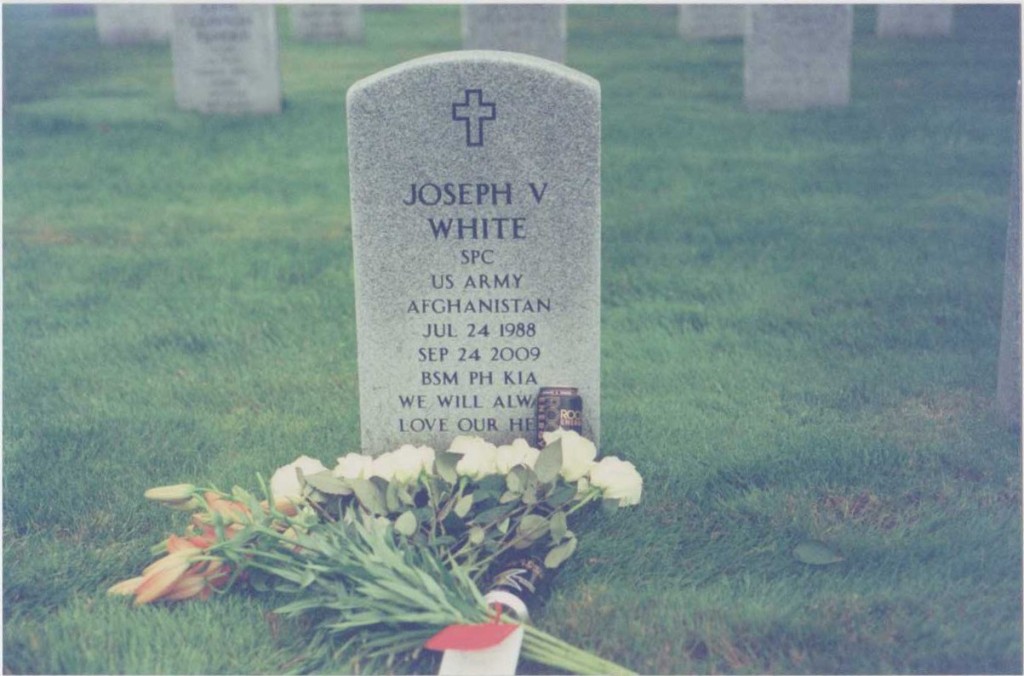Below this and the picture are some select parts of a post by Tom Engelhardt about memorial day. Scroll down and look at the list of towns. Those are the hometowns of the soldiers who’ve died this May while on duty in Afghanistan. There are twenty two towns, each recently struck by war’s curse: the death of a loved one. Year by year the wounds heal, but the scars are forever.
It’s Memorial Day and there’s a scarred town on my heart: Bellevue, Washington.
Thank you so much, Joe. We miss you :’-(
_________________________________________________________________________________
May is the official month of remembrance when it comes to our war dead, ending as it does on the long Memorial Day weekend when Americans typically take to the road and kill themselves and each other in far greater numbers than will die in Afghanistan. It’s a weekend for which the police tend to predict rising fatalities and news reports tend to celebrate any declines in deaths on our roads and highways.
Quiz Americans and a surprising number undoubtedly won’t have thought about the “memorial” in Memorial Day at all — especially now that it’s largely a marker of the start of summer and an excuse for cookouts.
[…]
Count on one thing: there will be no Afghan version of Maya Lin, no Afghan Wall on the National Mall. Unlike the Vietnam conflict, tens of thousands of books won’t be pouring out for decades to come arguing passionately about the conflict. There may not even be a “who lost Afghanistan” debate in its aftermath.
Few Afghan veterans are likely to return from the war to infuse with new energy an antiwar movement that remains small indeed, nor will they worry about being “spit upon.” There will be little controversy. They — their traumas and their wounds — will, like so many bureaucratic notices, disappear into the American ether, leaving behind only an emptiness and misery, here and in Afghanistan, as perhaps befits a bankrupting, never-ending imperial war on the global frontiers.
[…]
Afghanistan has often enough been called “the graveyard of empires.” Americans have made it a habit to whistle past that graveyard, looking the other way — a form of obliviousness much aided by the fact that the American war dead conveniently come from the less well known or forgotten places in our country. They are so much easier to ignore thanks to that.
Except in their hometowns, how easy the war dead are to forget in an era when corporations go to war but Americans largely don’t. So far, 1,980 American military personnel (and significant but largely unacknowledged numbers of private contractors) have died in Afghanistan, as have 1,028 NATO and allied troops, and (despite U.N. efforts to count them) unknown but staggering numbers of Afghans.
Spencerport, New York
Wichita, Kansas
Warren, Arkansas
West Chester, Ohio
Alameda, California
Charlotte, North Carolina
Stow, Ohio
Clarksville, Tennessee
Chico, California
Jeffersonville, Kentucky
Yuma, Arizona
Normangee, Texas
Round Rock, Texas
Rolla, Missouri
Lucerne Valley, California
Las Cruses, New Mexico
Fort Wayne, Indiana
Overland Park, Kansas
Wheaton, Illinois
Lawton, Oklahoma
Prince George, Virginia
Terre Haute, Indiana.
As long as the hometowns pile up, no one should rest in peace.

